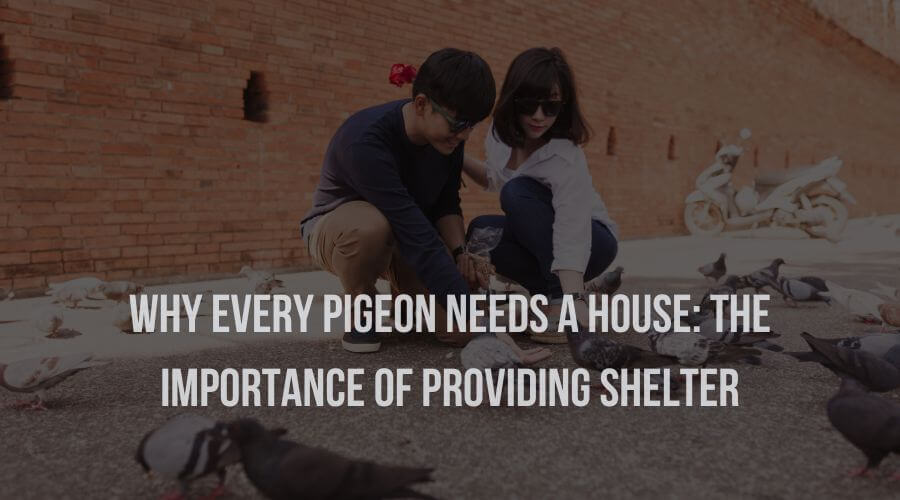Introduction
Pigeons are often regarded as pests and nuisances in urban environments. However, these birds are an essential part of our ecosystem, and they play an important role in keeping our cities clean. Unfortunately, due to the destruction of their natural habitats and a lack of understanding, many pigeons have become homeless, leaving them vulnerable to the elements and predators.
In this blog post, we will discuss why every pigeon needs a house and the importance of providing shelter to them.
Why Do Pigeons Need Houses?
Pigeons are domesticated birds that have been living alongside humans for thousands of years. As a result, they have become accustomed to living in human-made structures such as buildings and bridges. In the wild, pigeons would typically nest in trees or cliffs, but in urban environments, these options are often not available.
Pigeons need shelter for several reasons:
- Firstly, the shelter provides protection from the elements such as rain, wind, and extreme temperatures. Without shelter, pigeons can suffer from hypothermia or heat exhaustion, which can be fatal.
- Secondly, the shelter provides a safe space for pigeons to lay their eggs and raise their young. Pigeons typically mate for life and will return to the same nesting site year after year. If they do not have a safe and secure nesting site, their offspring may be at risk of predation or injury.
- Finally, shelter can also help to reduce the risk of disease transmission between pigeons. Pigeons often congregate in large groups, which can increase the spread of diseases such as avian influenza and salmonella. Providing shelters can help to reduce the density of pigeon populations, reducing the risk of disease transmission.
The Importance of Providing Shelter to Pigeons
1. Protecting the Environment
Pigeons are scavengers, and they play an important role in keeping our cities clean by eating discarded food and other waste. By providing shelters for pigeons, we can help to encourage them to stay in a particular area, reducing the spread of waste throughout our cities. Additionally, pigeons are important pollinators, and their presence in urban environments can help to support local ecosystems.
2. Improving the Health of Pigeons
Without proper shelter, pigeons can be exposed to harsh weather conditions and predators, leading to injuries and illnesses. By providing shelters, we can help to improve the health and well-being of pigeons, reducing the risk of disease transmission and ensuring that they are able to continue playing their important role in our cities.
3. Reducing Conflict Between Pigeons and Humans
Pigeons are often seen as pests and nuisances in urban environments. However, this is largely due to a lack of understanding about these birds and their behaviour. By providing shelters for pigeons, we can help to reduce the density of pigeon populations in certain areas, reducing the likelihood of conflict between pigeons and humans.
4. Building Compassion and Empathy
Providing shelters for pigeons is an act of kindness and compassion, and it can help to build empathy and understanding towards these birds. By taking care of pigeons, we can also inspire others to take similar actions, helping to create a more caring and compassionate society.
Types of Pigeon Houses
There are several types of pigeon bird houses available, ranging from simple and inexpensive to more elaborate and expensive designs.
1. Nest Boxes
Nest boxes are simple structures that provide a secure space for pigeons to lay their eggs and raise their young. They are typically made from wood and can be mounted on walls or placed on flat surfaces. Nest boxes can be purchased or easily constructed at home.
2. Roosting Boxes
Roosting boxes are larger structures that provide shelter for pigeons to roost and sleep. They are typically made from wood and can be mounted on walls or placed on flat surfaces. Roosting boxes can be open on one side or enclosed, providing extra protection from the elements.
3. Pigeon Lofts
Pigeon lofts are larger structures that provide ample space for pigeons to live, breed, and roost. They can be custom-built to fit the specific needs of the pigeons and the environment they will be placed in. Pigeon lofts can be expensive and require regular maintenance, but they provide the most comprehensive shelter for pigeons.
Conclusion
Providing shelter for pigeons is a simple yet effective way to promote a healthier and more compassionate urban environment. If you are looking to provide shelter for pigeons but don’t have the time or resources to build your own pigeon house, there are several options available for purchase for pigeon houses online.
You can find pigeon houses for sale at Sparrow Daughter, offering a variety of pigeon houses that are designed to provide a safe and secure space for pigeons to nest and roost. Investing in a pigeon house online or in-store is a great way to support pigeon welfare and create a more compassionate urban environment.


2 thoughts on “Why Every Pigeon Needs a House: Importance of Providing Shelter to Them”
Comments are closed.